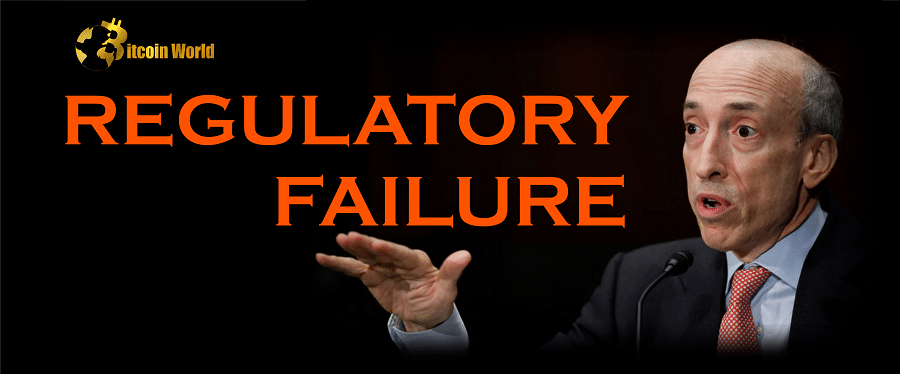The world of cryptocurrency is no stranger to volatility, but recent events have sent shockwaves through the industry. From the collapse of Terra to the bankruptcies of Celsius, Voyager, and FTX, the need for clear and effective regulation has never been more apparent. Amidst this turmoil, Republican Senator Tom Emmer of Minnesota has emerged as a vocal critic of Securities and Exchange Commission (SEC) Chairman Gary Gensler, accusing him of significant “regulatory failings.” Let’s dive into why Senator Emmer is demanding answers and what this means for the future of crypto regulation.
Emmer’s Scathing Critique: “Useless” Information Gathering and Regulatory Failures
Senator Emmer hasn’t held back in his criticism of Gensler and the SEC’s approach to the crypto space. He argues that the SEC’s efforts to gather information from crypto businesses have been ineffective and ultimately “useless.” This strong statement comes after a series of high-profile crypto collapses, which Emmer suggests could have been mitigated with more proactive and efficient regulatory oversight.
In a fiery tweet to his followers, Emmer referenced a bipartisan Blockchain Caucus letter sent to the SEC back in March. This letter, co-authored by Emmer, already pointed out concerns that the SEC’s information requests were:
- Haphazard and unfocused: Lacking a clear strategy or direction.
- Not targeted or purposeful: Failing to address specific risks or issues within the crypto industry.
- Unclear: Leaving crypto businesses uncertain about what information was actually required and why.
Emmer contends that these initial concerns were not adequately addressed by Gensler’s response, which he describes as evasive and focused on simply explaining the SEC’s organizational structure rather than tackling the core issues of regulatory methodology.
The Demand for Accountability: Gensler Must Testify
The Senator’s frustration has reached a boiling point. He is now calling for Gary Gensler to appear before Congress and answer tough questions about the consequences of what Emmer sees as “regulatory failings.” Emmer emphasizes the need for transparency and accountability, especially given the significant impact these regulatory decisions have on the burgeoning crypto industry and the investors involved.
According to Emmer, Gensler hasn’t faced the House Committee on Financial Services since October 2021. This absence, Emmer argues, has created a vacuum, leaving crypto media to speculate and fill in the gaps left by the SEC’s perceived lack of investigative action. He believes it’s time for Gensler to directly address Congress and the public about the SEC’s approach and its outcomes.
The Ripple Lawsuit and the Howey Test: A Point of Contention
A significant part of the SEC’s crypto strategy, particularly under Gensler, has been to determine which cryptocurrencies qualify as securities under the Howey Test. This test, derived from a Supreme Court case, is used to assess whether an investment contract exists, thus bringing it under securities regulations. The ongoing lawsuit between the SEC and Ripple Labs, concerning its XRP token, is a prime example of this focus.
However, Emmer and other crypto proponents argue that this approach is too narrow and potentially stifles innovation. They believe that over-regulation and a focus on enforcement actions, rather than providing clear guidelines, are hindering the growth of the crypto industry in the United States.
Emmer’s Pro-Crypto Stance: Fostering Innovation, Not Stifling It
It’s important to understand Senator Emmer’s perspective. He is a long-time advocate for cryptocurrencies, believing in their potential as a valuable financial asset and a driver of innovation. His concern isn’t about avoiding regulation altogether, but rather about ensuring that regulations are clear, effective, and don’t inadvertently stifle the growth of the crypto industry in the US.
Emmer believes the US government should create a regulatory environment that fosters innovation in the crypto space, allowing it to flourish rather than pushing it overseas. He has consistently argued for a more balanced and pragmatic approach to crypto regulation, one that protects investors without hindering technological advancement.
Looking Ahead: What’s Next for Crypto Regulation?
Senator Emmer’s strong stance highlights a growing tension between some lawmakers and the SEC regarding crypto regulation. His demand for Gensler to testify before Congress signals a potential showdown and a push for greater accountability from the SEC. The coming months could be crucial in shaping the future of crypto regulation in the United States.
Will Gensler address Congress? Will the SEC’s approach to crypto regulation shift? The crypto community, and indeed anyone interested in the future of finance and technology, will be watching closely to see how this unfolds. One thing is clear: the debate over how to regulate crypto is far from over, and voices like Senator Emmer’s are ensuring that this conversation remains front and center in Washington.
Disclaimer: The information provided is not trading advice, Bitcoinworld.co.in holds no liability for any investments made based on the information provided on this page. We strongly recommend independent research and/or consultation with a qualified professional before making any investment decisions.




